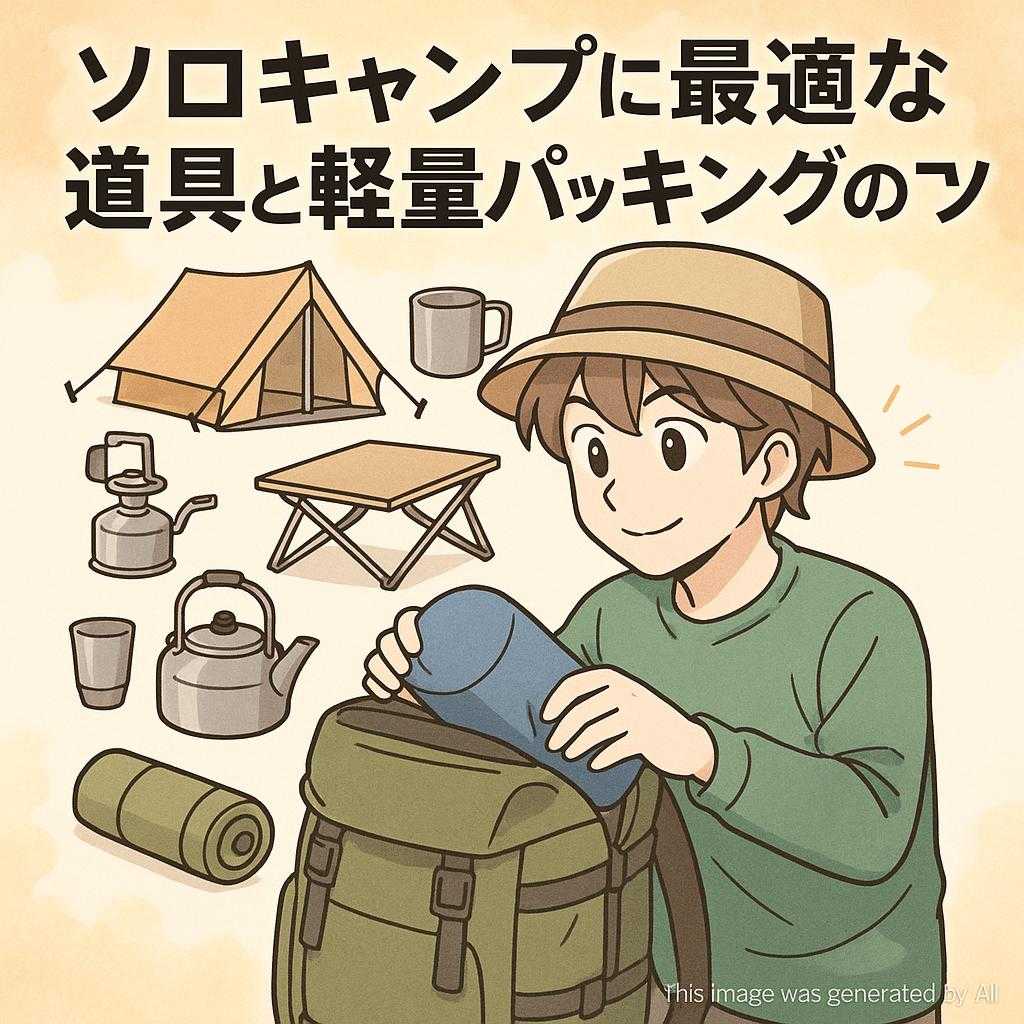
The Appeal of Solo Camping and the Importance of Lightweight Gear
Solo camping is a special experience where you can enjoy time alone in nature. Recently, this style of camping has gained support from many people because it allows for personal reflection. However, to enjoy solo camping more comfortably, lightweight gear is crucial. By choosing compact gear that fits into a backpack, moving and setting up become easier, allowing for a deeper connection with nature.
Benefits of Lightweight Gear include easier mobility. Carrying heavy luggage can quickly drain your energy, leaving you exhausted before reaching your destination. Additionally, lightweight gear allows for smooth setup and takedown, making efficient use of your time. Due to these benefits, many solo campers focus on lightweight gear selection.
This article will explain “Ideal Gear for Solo Camping and Tips for Lightweight Packing.” We will introduce easy-to-implement points and recommended items for beginners, so please use it as a reference. Whether you are just starting or are experienced, you might discover something new.
The Appeal and Importance of Solo Camping
Solo camping has been gaining attention from many people recently. Spending time alone in nature allows you to refresh and escape from daily life. This camping style is particularly attractive to busy modern people because it doesn’t require coordination with others and can be enjoyed at your own pace. However, to succeed in solo camping, choosing the right gear and packing techniques are important.
Selecting the Ideal Gear for Solo Camping
In solo camping, it’s essential to keep your luggage as lightweight as possible. Start with choosing a tent. A lightweight and compact tent is recommended. For example, a one-person double-wall tent offers both waterproofing and breathability, providing a comfortable sleeping environment. A sleeping bag is also an important item. A down sleeping bag is lightweight, easy to compress, and retains warmth even on cold nights.
Next, consider cooking gear. Lightweight aluminum cookware sets and foldable burners are space-saving and easy to carry. Also, choosing stackable tableware is a good idea. All these items fit easily into a backpack, reducing the burden during travel.
Choosing a Backpack
It’s important to also lighten the backpack itself. A capacity of about 30-40 liters is ideal, as it can comfortably hold the minimum necessary items. Additionally, choosing a design with a mesh back structure and a waist belt will make it less tiring to carry for long periods.
Tips for Lightweight Packing
Efficient packing is essential for solo camping. First, organize your items by category and place them in dedicated pouches or dry bags for quick access. This method is also useful in rainy weather, reducing the worry of contents getting wet.
Additionally, placing heavy items closer to your back helps stabilize the center of gravity. Small items and frequently used items (e.g., maps, water bottles) should be placed in outer pockets. These strategies allow for smooth access to essentials while on the move.
Choosing Gear Without Waste
Beginners tend to bring a lot of gear, but it’s important to select only what is truly necessary. For example, a multifunctional knife can handle various tasks, reducing the need for unnecessary tools. Also, near water sources, a bottle with a filter is recommended. This single bottle can safely secure drinking water, eliminating the need to carry large amounts of water.
Adjusting Gear for Each Season
The gear needed varies by season, so it’s important to review it each time. In summer, breathable clothing and sunscreen are essential. In winter, for cold protection, choose high-quality, lightweight materials like innerwear and windproof jackets to greatly enhance comfort.
Consideration for the Natural Environment
In solo camping, don’t forget to consider the natural environment. Always clean up the area you used and take all trash with you. To minimize impact on the ecosystem, using eco-friendly gear like small fire pits or biofuel stoves is recommended.
By preparing thoroughly in this way, you can achieve a safe and comfortable solo camping life. Enjoy the freedom and adventurous spirit unique to solo travel to the fullest.
Ideal Gear for Solo Camping and Tips for Lightweight Packing
Q1: What are the basic tools needed for solo camping?
To start solo camping, a tent, sleeping bag, and mat are basic essentials. These are important for ensuring a comfortable sleep. Additionally, lightweight cookware and a gas burner are necessary for cooking. It’s best to choose compact and easy-to-carry items.
Q2: What are the points for lightweight packing?
The key to lightweight packing is placing heavy items close to your body and lighter items below. This method helps stabilize your load. To efficiently use space inside the backpack, utilize compression bags and storage cases.
Q3: Are there recommended cooking tools for solo camping?
Titanium or aluminum cookware is recommended. These are lightweight, durable, and easy to carry. Additionally, using a small fire pit or gas burner allows you to enjoy a variety of meals.
Q4: Are there any tips for staying comfortable at the campsite?
For comfort, a relaxing chair and table are important. Choose foldable and compact ones. Also, don’t forget to prepare warm clothing and blankets for cold weather.
Q5: How can I reduce my luggage?
To reduce luggage, it’s important to bring only the minimum necessary items for an overnight stay. Choosing multifunctional items and products with a minimalist design can further lighten your load.
Summary:
In solo camping, preparation and efficient packing are key to success. By choosing lightweight and compact gear and organizing your load strategically, you can enjoy a safe and comfortable outdoor experience.
Summary
To succeed in solo camping, selecting the right gear and lightweight packing are crucial. Lightweight gear reduces the burden of travel and makes setup and takedown smoother. It’s recommended to choose compact and lightweight tents, sleeping bags, and cooking gear. The choice of backpack is also important, with the right capacity and design supporting a comfortable camping experience. Organizing your items leads to efficient packing, allowing quick access to necessities. Additionally, adjusting gear for each season and considering the natural environment are essential. By focusing on these points, you can achieve a free and comfortable solo camping life unique to solo travel. Enjoy your connection with nature through lightweight and efficient preparation.



